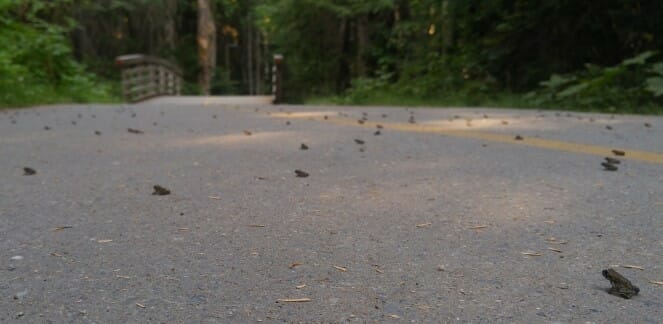Every summer, something magical happens at Lost Lake, but you might not know that it is taking place.
Thousands of tiny Western Toads journey from water to forest. They transform from jelly-like eggs to tadpoles, and finally into small toadlets the size of a thumbnail. It’s one of nature’s most incredible migrations, happening right here in Whistler.
These tiny creatures face large threats. They include Valley Trail and road traffic, off-leash dogs, shoreline activity and climate change. To help them survive and thrive, we have created a network of protections. These include the Toad Migration Corridor, shoreline fencing and educational signs.

Western Toads aren’t just cute — they’re crucial. They play an important role in ecosystems and are considered a key indicator species that help us understand the overall health of Whistler’s ecosystems. For example, Western Toad tadpoles consume algae and detritus, helping to keep the water in Lost Lake clear.
Their populations are vulnerable to human impacts like development and urbanization. Protecting these toads is essential for understanding how ecosystems adapt to climate change — and for maintaining their role as ecological indicators.

This short documentary invites you to dive in and explore the Western Toad’s hidden world. Narrated by Feet Banks, this story features stunning cinematography and animation. Our aim is to inspire you to get involved.
Watch the video to discover how the Western Toads grow, change, and migrate. Learn what’s threatening their survival, what Whistler is doing to help, and how to be a part of it.

How you can help the toads at every stage of their migration
- Adult Breeding (spring): stay on designated trails, keep dogs on leash, and avoid entering wetland areas.
- Tadpoles (early summer): Do not touch, catch or remove tadpoles from the lake. Avoid entering wetland zones — these are extremely sensitive habitats. Toad and tadpole skin is porous, and even natural salts or oils from human hands can cause harm.
- Toadlet Migration (mid to late summer): Take extra care when walking or biking near Lost Lake. Toadlets are the size of a fingernail and are easy to miss. Watch for on-site signs indicating trail closures, detours and hot spots where migration activity is high.
Watch the full video to discover the fascinating life cycle of these tiny toads. You will also witness the power of local conservation in action.
Let’s work together to keep Lost Lake safe for all Whistler’s residents; tiny toads included.

Learn more, find updates, and explore volunteer opportunities
Visit Western Toads.
If you would like to volunteer to help out with the 2025 Western Toad migration, please contact our Environmental Stewardship Team at stewardship@whistler.ca.
This work aligns with Council’s strategic priority of Smart Tourism. It highlights our approach to responsible destination management. We are creating a vision that defines Whistler’s own version of tourism. The purpose is to inspire and align residents and resort guests on a renewed vision for tourism in Whistler. Read the full vision and tell us what it inspires in you.
Video: Donderlab/Alto MM
Narrator: Feet Banks